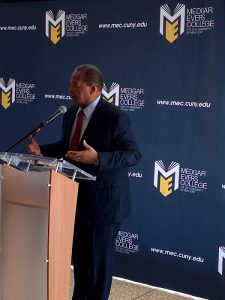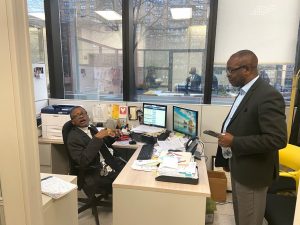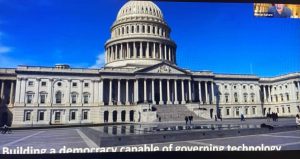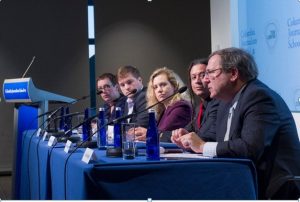How Medgar Evers College, City University of New York is converting obstacles into opportunities during Covid-19 Crisis

The story of Covid-19 storm is still unfolding. Colleges and universities are still counting the cost of the impact of the pandemic. The full economic, cyclical and structural effects are not quite visible yet, but, in any case, they will be gigantic. While other colleges grapple with the challenges posed by the pandemic, Medgar Evers College in dynamic ways is converting the obstacles of the public health crises into opportunities to grow out of the crisis. During the lockdown, the college devised effective strategies to pay more attention to students’ vulnerabilities. Faculty members adopted a more student-centric approach to teaching and have demonstrated a greater appreciation of students’ diverse needs and challenges.
At the same time, the Medgar Evers College student support services have risen to the challenge of the moment, putting their services online and expanding their capacity to meet students’ mental health, food, housing, financial, and technology needs. The College also established food pantries, connecting students and their families to the internet, distributing food and other supplies to vulnerable populations as deliberate steps towards a post-pandemic recovery.
In this report, I will highlight the activities of the college during the Covid-19 lockdown that demonstrate the resilience of faculty, staff, and students of Medgar Evers College.
Focus on Students Success
President Rudolph Crew continues to believe that the primary obligation of his leadership is to ensure that our students re-enroll and progress toward their degrees. To this end, the college strengthened its capacity for virtual education and training pipeline to help support student recruitment, support, and retention goals
During the period, the Student Affairs Department distributed 507 laptops/Chrome books/iPads and 78 hotspots to students during the distance learning period. Student Affairs also acquired approximately $45000.00 in additional Petrie funds, which allowed us to increase the cap on Petrie grants, and to provide targeted assistance to nursing students to offset the travel costs associated with commuting to and from campus. Student Affairs has expended $50000.00 in standard Petrie funds, which has been used to assist students with rent arrears, past-due utility bills, and moving expenses associated with transitioning from an unsafe housing situation.
Within the distance learning period, Counseling and Psychological Services (CPS) facilitated 225 counseling sessions, and approximately 120 outreach calls. CPS also acquired ad hoc counselors from amongst the clinical faculty within the Departments of Social Work and Psychology, and in fall 2020, implemented virtual “open” counseling hours that has resulted in increased access to mental health professionals and services.
In addition, the Office of Student Life and Development moved all of its programmings online in an effort to increase student engagement. So far, the office facilitates at least two events each week. This year’s virtual Club Fair had more than 150 attendees and was MEC’s largest online event since the start of the distance learning period.
Lisa Evelyn, who leads the Center for Women’s Development has contacted all of the Foster Youth College Success Initiative (FYCSI) students enrolled at MEC and ensured that they are aware of the services and sources of support available to them during distance learning. In addition, she assists with marketing, promoting, and managing device distribution. Lisa has also become a Life Coach and is utilizing these skills to offer students additional social and emotional support. During the distance learning period, the CWD had approximately 200 direct contacts with students (via virtual workshops, one-on-one meetings, and phone calls).

President Rudolph Crew
Student Engagement, Retention, and Recruitment
The College priority to increase recruitment and retention continued within the period of the pandemic. Precisely, the College’s number of graduates has increased by 27% since 2014, culminating in the largest graduating class in the College’s history in 2019 of 1,284 students.
Simultaneously, the College ranks in the top 5% of U.S. colleges and universities for creating economic mobility for its students. This statistic is not surprising given that MEC’s Performance Management Process (PMP) data from the City University of New York that continues to show an upward trend across categories.
To sustain student engagement, retention, and recruitment, the college embarked on the following:
• Hosted student and faculty orientation
• Launched nine-week Alumni Shining Zoom series led by Raquel Bennett on October 14 for the purposes of student engagement, encouragement, retention, and as a possible promotion tool. Click here to view the conversation with Robert Tressler.
• Piloting web tool to improve international interest in online programs that if proves successful, may propose an implementation for Fall 2021. The college continues to review offers from potential partners to help support our student recruitment, support, and retention goals.
Distance Learning Training
In response to the necessary transfer from face-to-face instruction to and online instructional environment in response to the COVID-19 pandemic, MEC mounted an aggressive training schedule for faculty and staff. These training ranged from refreshers on the use of Blackboard to higher-level online strategies. A total of 96 faculty completed training in the delivery of online instruction. A substantial percentage of these faculty attended and passed multiple pieces of training.
· 53 faculty earned the CUNY Bb Basics certificate (in either the self-paced or the CTLE facilitated Enhanced course).
· 26 earned The MEC Center for Teaching and Learning Excellence Enhanced Bb Basics certificate.
· 25 earned the CUNY Bb certificate while in the workshop.
· 65 passed the School of Professional Studies Online Teaching Essentials (OTE) training.
School of Business
The School of Business continues to broaden opportunities for faculty, staff, and our students’ engagement. The chairpersons from Accounting, Computer Information Systems, Business Administration, Economics and Finance, and Public Administration in coordination with Dean Rolle used Zoom to hold meetings and programs as well as communicate with students by email and Google Voice with responses obtained within 24-48 hours.
Other initiatives include the following:
• Establishment of a chat group for student engagement amongst themselves and with the Program Manager.
• Email bi-monthly “Dean’s Office Check-In” to students asking them how they were doing and providing them with School, College, and CUNY news, information, and COVID-19 planning.

At the Department of Computer Information Systems at Medgar Evers College (MEC), all courses are taught fully online asynchronously based on the decision by the Office of Academic Affairs.
Differently Abled Services
The Director of Differently Abled (DA) Services, Anthony Phifer, is working directly with all faculty who need guidance regarding administering exams remotely and virtual proctoring. DA Services have also worked alongside the college’s Blackboard Administrator and CUNY’s Assistive Technology Team (CATS) to assess technological needs, and provide assistive technology (i.e., JAWS, Kurzweil 3000, ZoomText) to DA students.
Although CUNYAC canceled the fall 2020 season, the Department of Athletics and Intramurals have continued to engage athletes via workshops tailored to their experiences, and a series of monthly town halls where they receive updates regarding sports programs, fitness and safety, and advisement and registration. In an effort to achieve student-athletes engagement, and build a sense of (virtual) community, Athletics has secured and will be launching its eSports platform in November.
During the distance learning period MDEC tutors and peer mentors have facilitated over 100 tutoring sessions and made approximately 200 outreach calls and emails to students who need assistance with securing campus resources such as counseling, the food pantry, interfaith services, financial aid, and advisement.

Director of Differently Abled Services, Mr. Pifer and College Provost, Dr. Augustine Okere
Food Pantry/Transition Academy
As a member of Food Bank NYC, and its partnership with the Bed-Stuy Campaign Against Hunger, the MEC’s Transition Academy (TA) has solidified a partnership with the F.O.O.D. Foundation, which has increased offerings, and has allowed the Cougar Country Pantry to serve members of the surrounding community who are food insecure. During the distance learning period, the TA has distributed approximately 1,000 bags of food to students, staff, and members of the surrounding community who are food insecure.
In an effort to ensure that students still have access to health and wellness services during the campus closure, the Office Health Services, via Director Althea Willie, has partnered with insurance companies (including MetroPlus, Fidelis, and United Healthcare), community-based organizations, and medical facilities that have agreed to provide direct service and resources to MEC students. Althea also assists with marketing, promoting, and managing device distribution.
Throughout AY 2019/2020 the MEC Transition Academy (TA) remained committed to addressing students’ homelessness, housing issues, and food insecurity which impact degree completion. Partnering with the Supplemental Nutrition Assistance Program (SNAP) and in collaboration with the MEC Cougar Country Food Pantry, the TA provided services to 1,812 individual students. A total of 4,915 goods was distributed, including campus dining vouchers, grocery bags, clothing, Metro Cards, and Thanksgiving meals. SNAP pre-screening services included 130 students.
In fall 2019, 995 students accessed TA services. The COVID-19 pandemic and the subsequent social distancing requirements led to spring 2020 decreases in the number of students served (817) and the number of goods distributed (1,979). The Pantry remained accessible to students during reduced hours.
As a result of the campus being closed from March 2020 to the present due to the COVID-19 pandemic, the TA and Cougar Country Food Pantry (CCFP) has remained diligent in ensuring that students are not going unsheltered or unfed. Moreover, the TA helped 15 students through virtual contact to either avoid eviction, secure housing or navigate New York City shelter system. Since March 17, 2020, CCFP distributed an additional 1,373 food packages to students that have been food insecure. In addition, CCFP remained open for grab-and-go throughout the pandemic three days a week (i.e. Monday 10 am-2 pm, Tuesdays 3 pm-7 pm, and Wednesday 10 am-2 pm) to accommodate students’ schedules. The TA foresees meeting, if not exceeding, fall 2019 contacts and services by providing access to local, state, and federal services and resources and increasing the donations that are used to support its efforts.
Fighting Disinformation
The College External Relations and Communications Office continues to help public health authorities, community service providers, and nonprofits disseminate essential information, combat disinformation, maintain informational websites. Like most public institutions, Medgar Evers College continues to face the challenge of the parallel pandemic of Coronavirus and disinformation.
A few disgruntled faculty and staff who were reassigned or removed in the college leadership because of very poor job performances have exploited the misinformation age to engage in a campaign of calumny, peddle unsubstantiated claims against the College President, Dr. Rudolph Crew to distract the college community from focusing on the reform agenda of the present leadership. These individuals feed malicious content to several tabloids and other news organizations. While the leadership of CUNY and Medgar Evers is poised to minimizing the impact of the COVID-19 pandemic through the provision of a smooth transition to a virtual learning environment, these few selfish and disaffected faculty are busy creating a parallel pandemic of misinformation, disinformation, and dystopia.
The initial the action of the college was to ignore the smear campaigns but had to respond at some point. The college responded to the false accusations levied against it in a two-part story that appeared on News12 on Wednesday, October 14 and Thursday, October 15, 2020. In a protest letter to News 12 News management, the college maintained that “the charges presented are patently wrong, and the information presented is misleading.”
While the college fights malicious disinformation campaign originating from inside the college, it is also heartwarming to note that activities in the college are also receiving positive reviews in the mass media operated internally.
Notably, the college-run public radio and television stations continued to host educational programs and community forums, while faculty share their expertise, make relevant academic research widely available and assist with community surveys. WNYE 91.5 FM and WNYE television station that is operated by NYC Media, a division of the Mayor’s Office of Media and Entertainment featured stories from Medgar Evers College produced and edited by the Department of Mass Communications and MEC-TV. Four separate programs on the 50th Anniversary Committee’s Academic Lecture Series and the 2019 Dr. Mary Umolu’s Jazzy Jazz Festival was broadcast in September and October.
Academic School Lecture Series such as “Why America Black Mothers and Babies are in a Life-or-Death Crisis” by Ms. Linda Villarosa, Journalist and Professor; “Black Girl Magic – Celebrating Women: Transforming Business, Wealth, Family and Community” by Ms. Jillian Joseph, Managing Director and Associate General Counsel TIAA were among the events highlighted by the in-campus mass media.
Research and Library Services
Perhaps the biggest single contribution our campuses can make to the recovery lies in our area of special expertise: research. Medgar Evers College is supporting research in training, STEM, epidemiology, immunology, virology, and community health?
The MEC-CRSP (CUNY Research Scholar Program) received a commitment for 2020-21 reduced funding and currently recruiting 14 (fourteen) students for research training for 2020-21 academic year. CRSP is a critical component of SSH&T’s core mission to provide authentic research opportunities to the interested undergraduate students of Medgar Evers College under the direct mentorship of SSH&T program faculty. CRISP participation is limited to Associate in Science (AS) students from any STEM discipline.
This year the CRSP provides $4,000.00 to each student for their 320 hours of mentored research training. The faculty mentor will receive $1,000.00 worth of research supply/summer stipend per student.
Since 2014, faculty members have generated more than $30 million in grants, awards, and other funding for campus improvements, research, and student programs. The College has grown into a global campus with research, programs, and partnerships in Africa, the Caribbean, China, and India.
During the pandemic, the Library at Medgar Evers College has continued to provide library services to students and faculty in the online distance learning college community remotely. The library has offered students Virtual Chat Reference Services, Seven days a week.
The library provides reference services, information literacy instruction, and individual consultations to students and faculty via the live “chat with a librarian” chat box, Ask-A-Librarian email, and or Zoom. Since the virtual chat box was added mid-March, librarians have fielded roughly 1300 chat requests, 200 follow-up emails, 25 individual chat sessions, and 20 phone sessions.
Information Literacy: The library is teaching seven asynchronous credit-bearing information literacy classes– LIB100 Library and Research Methods, and also offers Information Literacy one shot sessions.
· Library Fines: Late fees have been waived during the COVID-19 emergency.
· Laptop loan program: 70 library laptop computers were prepared and distributed to students in mid-March.
· Online Resource: The library provides students with access to a vast variety of free and licensed online resources. Our OneSearch portal enables students to find free online articles, e-books, journals, reference materials, videos, and more.
· OER (Open Education Resources): The collaboration between the Library and CTLE (Center of Teaching and Learning) has continued during the pandemic. Due to distant learning and online classes, library faculty have been more involved in helping to find zero cost replacement alternatives to print versions of textbooks.
· The Library Archives & Special Collection: The unit has been working on online exhibits that present various aspects of the rich historical and material heritage of Medgar Evers College. These exhibits may be launched virtually as part of the 50th Anniversary celebration.
· Cataloging: ALMA the cloud-based library management platform was launched this semester. Library faculty and staff are now able to work remotely without having to use a VPN on their computers.
Financial Support for Students: Emergency Grant Fund
The Carroll and Milton Petrie Student Emergency Grant Fund, a 3-year renewable grant, assists vulnerable students to persist and graduate by providing funds to address their socio-economic challenges. Typically, these funds are a one-time grant enabling students to address unforeseen financial emergencies. The Grant is administered through the College’s Office of Student Affairs. The total number of students assisted by the Carroll and Milton Petrie Grant for the academic year (AY) 2019-2020 was 921. The Grant assisted 563 students during fall 2019. The spring 2020 COVID-19 responses required closures of the campus, while all services were converted to an on-line environment, Student Affairs worked with The Carroll and Milton Petrie Foundation to relax grant guidelines and was , therefore, able to provide students with “mini-grants” that ranged from $150 to $1,000. Students used these grants to cover a variety of expenses including rent arrears, utility bills, and groceries. Additional support was provided to students living in a shelter or who experienced unemployment as a direct result of the COVID-19 pandemic. For the spring 2020 semester, Grant funds assisted 358 students.
In addition to funding direct student grants, the Petrie Food Insecurity Grant funds also supported the MEC Transition Academy/Cougar Country Pantry. The MEC Transition Academy/Cougar Country Pantry has remained open 3-days per week during the COVID-19 crisis and is available to CUNY students who do not attend Medgar Evers College.
Outreach and Activities
Through relationships with local schools under the aegis of Brooklyn Pipeline, Medgar Evers College offers Science, Technology, Engineering, and Math – STEM programs for local students. Similarly, the institution shares knowledge, expertise, and energy with the Brooklyn community and beyond by encouraging students to create and conduct an annual tour of the Crown Heights neighborhood as part of city-wide festival inspired by urban activist Jane Jacobs.
In addition, the Community Council of the College made up of local residents, activists, organizations, and elected officials remain part of the pillars of support. Through its outreach, the Community Council attracted $250,000 in scholarships for students.
At the international arena, a team of MEC students led by Chemistry and Environmental Science Professor, Jim Shin joined their counterparts at Hebei University of Science and Technology in China to research water pollution and to find ways to promote environmental consciousness about water pollution. Similar international initiatives have become a regular feature of the college internationalization program towards meeting the college priority to connect the institution to the global community.
The Center for Women’s Development (CWD) The Center for Women’s Development has maintained its student outreach efforts during distance learning, and continues to assist students with socioemotional issues, including time management and the prioritization of tasks, grief, stress, and anxiety.
As part of the fulfillment of its 2020 strategic vision, Medgar Evers College redoubled efforts to put its footprints around the world through an enhanced study abroad program.
A progress report published by the Concerned Faculty, Staff, and Students, indicates the college-sponsored 144 students for the Study Abroad program from 2014 to 2019 compared with 12 students who participated in the program during the preceding administration from 2007 to 2013. This means that more students had international educational experience with the potential to become global change agents.
The report also reveals trail-blazing accomplishments across sectors including the establishment of the first professional degree – the BFA Media & Performing Arts in 2018 with 54 students. Within the five-year period of 2014-2019, additional degree programs were introduced such as the BA Religious Studies, BS Social Work, and B.S. Financial Economics with a combined student enrollment of 258. The first fully online B.S. Financial Economics Degree program was introduced in 2019.






